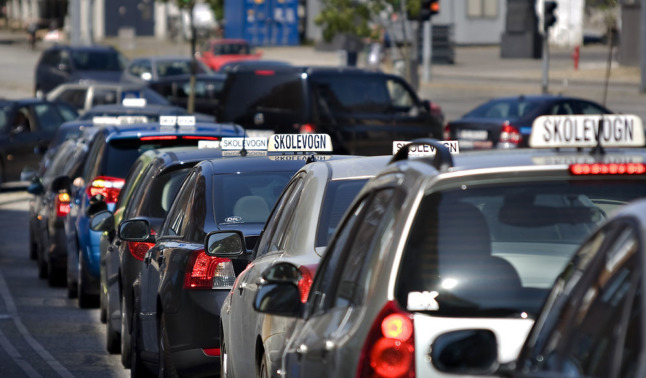No more barriers (or hedges) for gardeners
Are you a hobby gardener, eager to trim your overgrown hedges? Starting on October 1st, you can safely bring out your shears again. In the period from March 1st to September 30th, German law forbids hacking away at hedges. The justification? The habitat of birds and other animals should be protected, and violators of this law will be slapped with large fines.

There's good news for hobby hedge trimmers in October. Photo: DPA
Driving change
On October 1st, the list of questions for driving tests will again be revised. Some old questions will disappear, whilst new ones will be added – meaning that 48 questions in total will be changed. Those prepping for the test should make sure that their practice software (Lernsoftware) is up-to-date – otherwise some questions might come as a surprise.
READ ALSO: What you need to know about getting a German driving license
Removing the queue
Previously anyone who purchased a new car or motorcycle in Germany had to queue up at their local administrative offices. But starting October 1st, the registration process will take place online.
But, this being Germany, it's not as simple as just having an online connection. Car owners will need an ID card with a special PIN function or a smartphone with an “Ausweis App” for transmitting their data. The registration will then be sent to them by post after a few days. However, this only applies to vehicles registered for the first time after January 1st, 2015.
Reduced lead content
For parents, it’s easy to get nervous when your child chews on something that is not edible – for example, a Lego piece. Within the EU, there have been concerns that these kinds of products contain too much lead, posing a danger to adults and particularly children. Responding to these concerns, the EU has decided to reduce the lead content from 160 to 23 milligrams on painted products like Lego.
Better nursing home assessment
From October, the quality of nursing homes will be assessed by a special external audit. Auditors will examine key criteria such as nutrition, body and wound care, as well as how nursing homes maintain the mobility of their residents.
The aim is to focus more on the actual care and support which residents receive. Nursing homes themselves are also slated to be better assessed, for example in terms of staffing and accessibility.
READ ALSO: Explained: How Germany plans to fight its drastic shortage of care workers
The results will be published on the websites of the health and nursing insurance funds, and posted in the facilities. With increased transparency, this information is aimed at helping residents better choose the right home.

Photo: DPA
Higher rent subsidy
From October 1st, low-income households in Berlin can look forward to a higher rent subsidy (Mietzuschuss). However, the exact amount will be decided on this month by the Berlin Senate.
Better protection on eBay
Starting next month, online marketplace eBay will put in place additional measures to protect sellers, in particular those using the eBay Plus service. In future, sellers will be able to retain 50 percent of the refund costs if the goods were damaged during return or if the buyer has already used them.
However, buyers also benefit from the changes. In future, retailers will have to specify certain article characteristics for the articles they offer.
Times are a’changin’
Eager for an extra hour of sleep on the weekend? That’ll be granted on Sunday, October 27th, as clocks are turned back from 3 am to 2 am, officially inaugurating shorter winter days. Daylight Savings Time has proved a contentious topic in Germany and the EU, and the practice of winding back – and forward – the clock will officially stop in 2021.
READ ALSO: Daylight savings abolition one step closer after EU parliament vote

Daylight Savings Time in the EU will be a thing of the past come 2021. Photo: DPA
Brexit showdown
After many date push-backs, it looks like this could be the last: Brexit is now scheduled to occur at midnight European time (11pm UK time) on October 31st. But whether Britain will leave the EU in a no-deal scenario – affecting the more than 117,000 Brits living in Germany – remains unclear. Follow our Brexit coverage for continual updates on what Britons in Germany need to know.



 Please whitelist us to continue reading.
Please whitelist us to continue reading.
Member comments